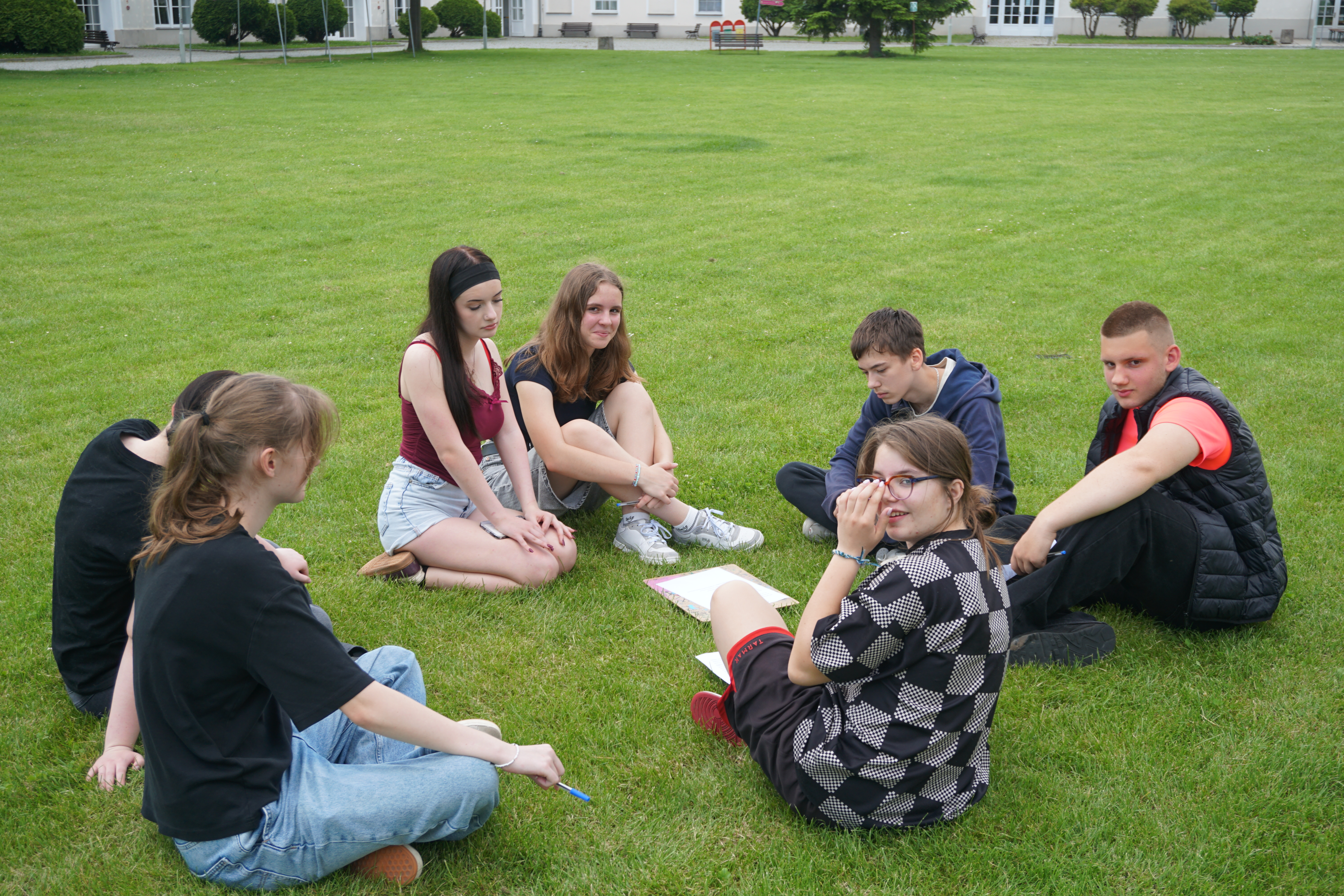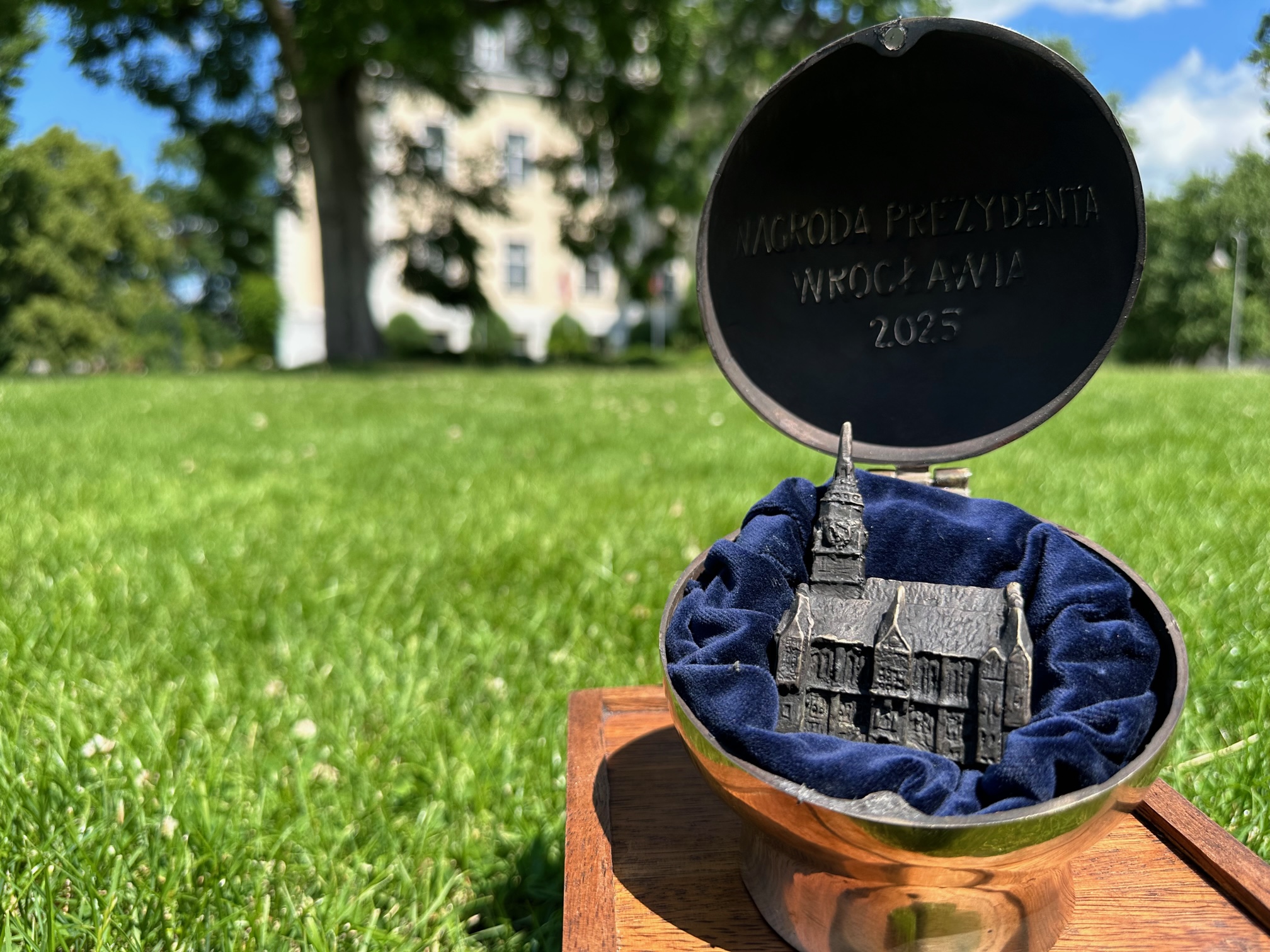 "Na początku trochę się stresowałem – nie znam zbyt dobrze niemieckiego i nie wiedziałem, czy dam radę się dogadać",p
"Na początku trochę się stresowałem – nie znam zbyt dobrze niemieckiego i nie wiedziałem, czy dam radę się dogadać",podzielił się swoimi obawami jeden z młodych uczestników międzynarodowego spotkania w Krzyżowej i z pewnością nie był w tym odosobniony. To właśnie z myślą o pokonaniu początkowych trudności, nieśmiałości i nieufności w nawiązywaniu kontaktu z nieznanymi osobami, stałym punktem projektów w Krzyżowej, są gry i zabawy integracyjne. I tak też było podczas spotkań uczniów z Forst i Lubska, Wrocławia i Berlina oraz Leszna i Berlina, którzy spędzili w Krzyżowej pierwsze dni czerwca.
Gdy już wspólnie stworzymy przyjazne warunki do rozmowy i budowania relacji, możemy przejść do realizacji warsztatów tematycznych. Młodzież, choć pochodzi z różnych krajów, ma bardzo podobne wartości – chce równego traktowania i wolności. Historia Helmutha James i Freyi von Moltke, którą okrywają podczas spotkania w Krzyżowej, jest dla nich przykładem, jak dbać o to, co jest dla nich ważne i jak świadomie podejmować decyzje.
Read more: Od niepewności do zrozumienia – młodzieżowe spotkania ponad granicami w Krzyżowej!
20 lipca w Krzyżowej koło Świdnicy, koncertem wirtuoza gitary i Gyspy swing, Joscho Stephana, rozpocznie się jubileuszowa edycja Summer Guitar Festival – największego kursu gitarowego w Polsce! W tygodniowych warsztatach udział weźmie kilkudziesięciu młodych muzyków z całego kraju i zagranicy, a w programie Festiwalu znajdzie się aż pięć koncertów otwartych dla szerokiej publiczności.
Program 25. Summer Guitar Festival obejmuje zajęcia indywidualne, warsztaty grupowe z orkiestry gitarowej i zespołu muzyki rozrywkowej, konkursy gry klasycznej na gitarze, a także wykłady i warsztaty lutnicze, podczas których uczestnicy poznają podstawy konserwowania i naprawy instrumentów. W dniach 23-26 lipca, odbędą się także wystawy instrumentów i akcesoriów muzycznych Interton Classic i Quena otwarte dla wszystkich zainteresowanych.
Read more: Gitarowe lato w Krzyżowej – 25. Summer Guitar Festival

In its 11th edition, the Krzyżowa-Music Festival will once again present top-level chamber music concerts in Lower Silesia, creating a musical programmatic bridge from West to East – connecting cities such as Vienna, Berlin, Wrocław, Kraków, and Warsaw. From August 26 to September 7, 2025, a total of eleven concerts and two symposia will take place. Internationally acclaimed musicians will focus particularly on the works of Polish composers and pay tribute to two greats: Ravel from Paris and Shostakovich from Moscow. For the first time, tickets will be available for purchase in advance – starting June 20, 2025.
Following the anniversary season in 2024, Krzyżowa-Music embarks on a new decade from August 26 to September 7, 2025, under the continued artistic direction of violinist Viviane Hagner and with the participation of outstanding musicians. Renowned international artists will collaborate with young, talented musicians to prepare 40 pieces from classical and contemporary repertoires. Among the Polish artists featured will be Gustaw Bafeltowski (cello), Adam Golka (piano), Zofia Neugebauer (flute), and Piotr Szumieł (viola) as Senior.
Read more: Krzyżowa-Music launches ticket presale!

With great joy and pride, we announce that the Krzyżowa Foundation for Mutual Understanding in Europe has been honored with the prestigious Mayor of Wrocław Award!
The award was received on behalf of the entire Foundation by our Managing Director and Board Member, Dorota Krajdocha, from the hands of the Mayor of Wrocław, Jacek Sutryk.
This distinction is a recognition of our long-standing and unwavering commitment to dialogue, reconciliation, and education. Since 1990, the Krzyżowa Foundation has promoted openness, a willingness to reconcile between nations, supported democratic values, and worked to build civil society in the spirit of tolerance and cooperation. We are proud that our work to build bridges of understanding has been acknowledged.
Read more: The Krzyżowa Foundation for Mutual Understanding in Europe Receives the Mayor of Wrocław Award!







